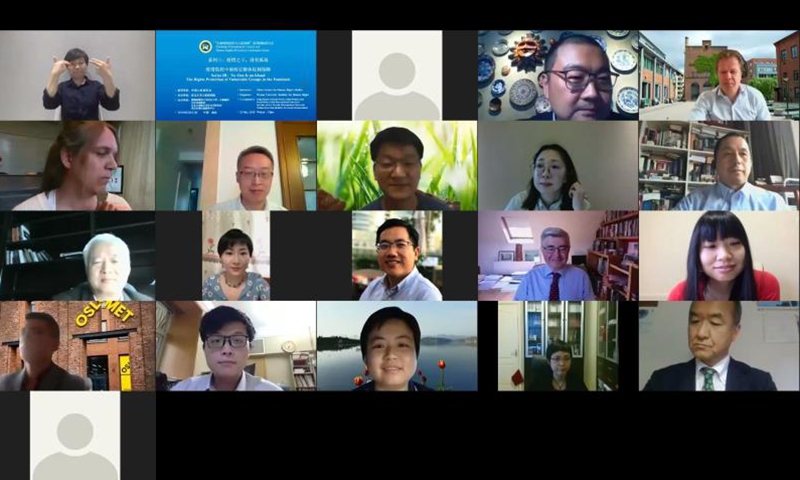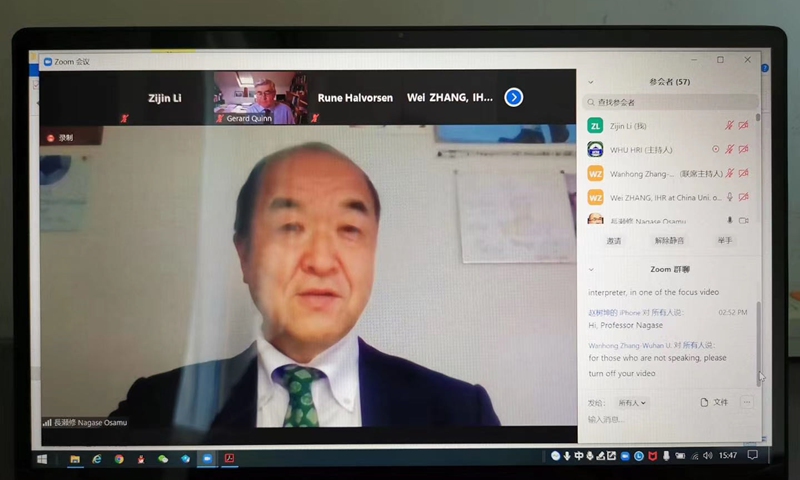Intl discussion on protection for vulnerable groups urges more attention
By Hu Yuwei Source:Globaltimes.cn Published: 2020/5/25 5:19:15

Screenshot of the online conference on the protection of rights of vulnerable groups amid the COVID-19 pandemic. Photo: Courtesy of Wuhan University Institute for Human Rights Studies
The COVID-19 pandemic is testing the world's human rights protection as the socioeconomic effects have impacted vulnerable and marginalized groups. Global experts and NGO's representatives on human rights protection urged policymakers to grant favorable measures that would benefit vulnerable groups and protect their rights during an online conference on Saturday.
Over 20 experts and delegates from China, Japan, UK, Norway, Sweden attended the virtual conference, launched by the China Society for Human Rights Studies and Institute for Human Rights Studies at Wuhan University. The event was aimed to provide a platform where they could exchange ideas on providing care facilities for vulnerable groups who have had a more difficult time fighting COVID-19, including the elderly, disabled, and migrant workers.
Considering the impact COVID-19 has had on those from different social classes, it requires more care and social intervention to protect certain groups, said Rune Halvorsen, a social work and child welfare expert from Oslo Metropolitan University.
COVID-19 has aggravated social inequality in Europe, said Halvorsen, referring to the poverty-stricken and less-educated population that have been most affected.
"People with mental health problems are isolated and do not have access to services, and people in linguistic minorities are also less likely to have access to basic health care due to language barriers," he said.
University of Leeds law school professor Gerard Quinn said the elderly and handicapped suffer from unequal treatment and have been unable to access health and related services during the COVID-19 pandemic.

Osamu Nagase shares his ideas during the online conference. Photo: Courtesy of Wuhan University Institute for Human Rights Studies
Citing the high COVID-19 fatality rate among the elderly in Europe and the US, Osamu Nagase, a professor from Institute of Ars Vivendi, Ritsumeikan University, underlined the danger of discrimination, sexism, racism, and ageism during the pandemic, and appealed for medical treatment triage decision-making to meet the principles of equal human dignity and non-discrimination.
Osamu cited an open letter from the International Disability Alliance sent to the World Health Organization encouraging governments to maximize resources to ensure that nobody is denied access to COVID-19 medical care as well as life-saving equipment, based on age or disabilities.
Huang Zhong, a researcher from the Business and Human Rights Resource Center raised attention to global migrant workers who are particularly vulnerable to the global medical crisis as many of them, especially in the Persian Gulf states, were unable to work due to travel bans or disrupted transportation.
"For example, in India or Singapore, migrant workers had to squeeze in dormitories because of city lockdowns, leaving them with greater risks to be infected," said Huang. "Their vulnerability was two-fold - financially hard-hit and physically threatened by the virus."
To help local marginalized people in precarious situations, employees with the Institute for Human Rights Studies at Wuhan University collaborated with other social groups and volunteers to educate the vulnerable in how to deal with the outbreak by translating virus prevention manuals and producing sign language videos, according to Zhang Wanhong, a professor with the Wuhan University Institute for Human Rights Studies.
China has always stressed rights protection for vulnerable groups, providing basic hygiene facilities to under-resourced communities, and caring for people who have a higher risk of being infected with COVID-19.
Zhang Haidi, chairperson for the China Disabled Person's Federation (CDPF), sent a letter to the WHO and other international organizations calling on the international community to pay attention to the care and rights protection of disabled people during the COVID-19 pandemic.
Posted in: SOCIETY